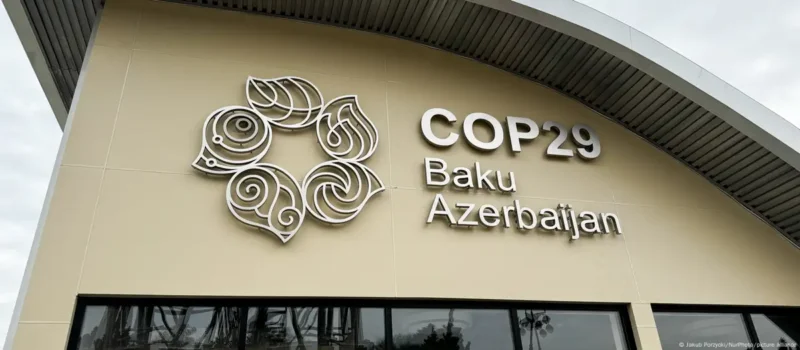Azerbaijan Unveils COP29 Agenda Amid Financial Stalemate

As the global climate crisis intensifies, the 29th Conference of the Parties (COP29) looms on the horizon, with Azerbaijan taking center stage as it unveils its ambitious agenda for the upcoming event. The nation has set its sights on addressing critical climate issues, from emission reductions to sustainable development. However, the unveiling comes amid a financial deadlock, as many participating nations face economic challenges that threaten to stall global progress on climate change.
Azerbaijan’s Role in COP29
Azerbaijan, a nation strategically positioned at the crossroads of Europe and Asia, has gradually emerged as a key player in international climate negotiations. Traditionally an energy powerhouse due to its significant oil and gas reserves, Azerbaijan has been under increasing pressure to transition towards greener energy solutions. With COP29 being a major international event, the country aims to showcase its commitment to sustainable development while balancing its economic reliance on fossil fuels.
The Azerbaijani government has pledged to reduce carbon emissions, increase renewable energy capacity, and promote green economic initiatives. Their COP29 agenda reflects a shift towards environmental responsibility, with a focus on integrating climate action into national policies. Key areas of focus include decarbonizing industries, reducing methane emissions, and promoting the adoption of clean technologies.
Key Elements of Azerbaijan’s COP29 Agenda
- Emissions Reduction Targets: Azerbaijan is set to announce ambitious carbon reduction targets, with a focus on reaching net-zero emissions by 2050. This aligns with global climate goals outlined in the Paris Agreement, but achieving these targets will require significant changes in Azerbaijan’s energy policies. The transition from fossil fuels to renewable energy sources like wind, solar, and hydroelectric power is at the heart of this effort.
- Renewable Energy Development: The country plans to accelerate its investment in renewable energy infrastructure. By 2030, Azerbaijan aims to generate at least 30% of its electricity from renewable sources, a significant leap from its current dependency on oil and gas. Projects are already underway, with partnerships in solar and wind power developments, including large-scale renewable energy parks in the Caspian Sea region.
- Mitigating Methane Emissions: Azerbaijan is also focusing on reducing methane emissions, particularly from its oil and gas sector. As one of the major contributors to global greenhouse gas emissions, methane poses a serious threat to climate efforts. Azerbaijan’s COP29 agenda emphasizes the need for stronger regulations and technological advancements to capture and reduce methane emissions from energy production.
- Adaptation and Resilience: Recognizing that climate change impacts are already being felt, Azerbaijan has committed to improving climate resilience and adaptation strategies. This includes enhancing infrastructure to withstand extreme weather events and integrating climate risks into national development planning. The country’s geographical location makes it vulnerable to droughts, floods, and rising temperatures, further underlining the need for robust adaptation measures.
- International Collaboration: Azerbaijan’s COP29 agenda calls for stronger international collaboration, particularly in sharing technology, expertise, and financial resources. The country has made it clear that climate change is a global challenge requiring collective action, and it intends to leverage its position to foster regional cooperation, especially with neighboring countries in the South Caucasus and Central Asia.
Financial Deadlock: A Barrier to Progress
Despite the ambitious agenda, Azerbaijan, like many other nations, is grappling with the financial realities of climate action. The global economic landscape has been strained by various factors, including inflation, post-pandemic recovery, and geopolitical tensions. Many developing and middle-income nations are struggling to secure the necessary funding to meet their climate commitments, and Azerbaijan is no exception.
One of the primary obstacles is the lack of sufficient climate financing from developed nations, which have yet to meet their $100 billion annual pledge to help developing countries tackle climate change. This financial gap has created uncertainty about how countries like Azerbaijan will be able to implement their ambitious plans. Without adequate funding, key initiatives, such as renewable energy projects and climate adaptation measures, could be delayed or scaled back.
In addition, private sector investment in green technologies has been slow to materialize, further exacerbating the financial challenges. Governments alone cannot bear the costs of transitioning to a low-carbon economy, and without robust public-private partnerships, achieving COP29’s goals will be an uphill battle.
The Role of International Climate Finance
International climate finance is a critical component of Azerbaijan’s COP29 agenda. The country is actively seeking funding from global institutions, including the Green Climate Fund (GCF), the World Bank, and the European Union, to support its transition to clean energy and climate-resilient infrastructure. Azerbaijan is also advocating for more equitable financial mechanisms, where developed nations contribute their fair share to the global climate fund and provide technology transfers to developing countries.
Azerbaijan’s COP29 delegation is expected to push for more transparent and accessible climate financing mechanisms, ensuring that the countries most vulnerable to climate impacts receive the support they need. This includes advocating for debt relief measures and innovative financing models, such as green bonds and climate risk insurance.
Looking Ahead to COP29
As COP29 approaches, Azerbaijan’s leadership and agenda will be closely watched by the international community. The financial deadlock poses a significant challenge, but Azerbaijan remains committed to advancing its climate goals. The success of its COP29 initiatives will depend not only on its national efforts but also on the collective will of the international community to address the financial gaps hindering global climate progress.
Azerbaijan’s unveiling of its COP29 agenda is a bold statement of intent, but the real test will be in the implementation. As climate change continues to affect millions worldwide, the stakes have never been higher. COP29 offers a crucial opportunity for nations to come together and forge a sustainable future, and Azerbaijan’s role in this global dialogue will be pivotal.


